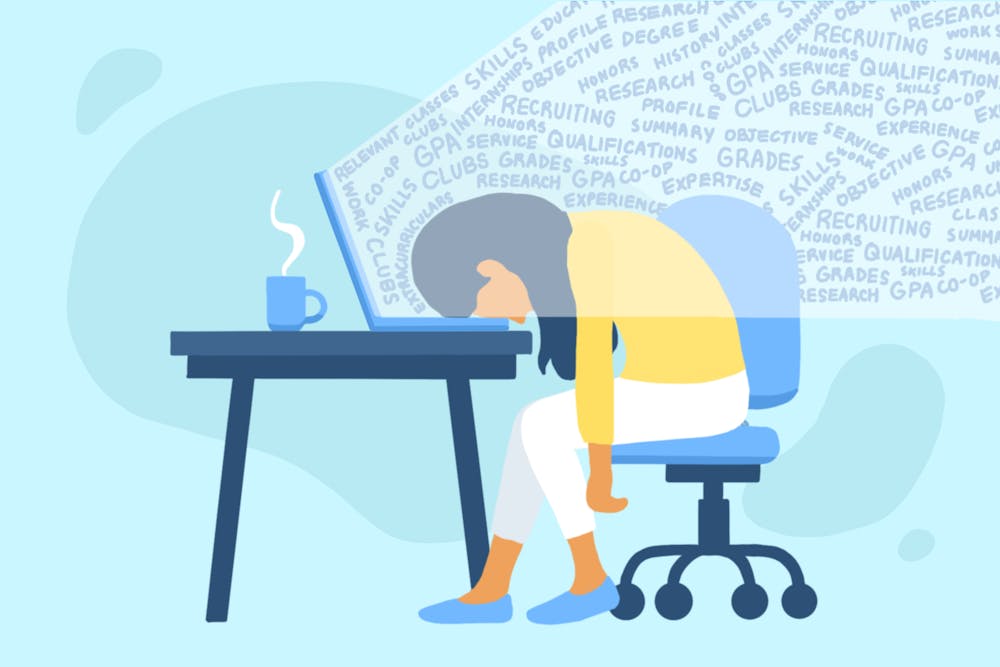
Prior to the COVID-19 pandemic, it was clear that many college students were not doing well. Researchers noticed an increase in students entering college with psychiatric diagnoses and increasingly using mental health services for many conditions including depression, anxiety, substance use disorders, and ADHD. There are now college rankings on how depressed a school’s student body is. If you listen to students’ conversations around many college campuses, you’ll likely hear conversations about sleep deprivation, hefty workloads, overcommitment, and burnout.
In my first few semesters at Penn, I have noticed that such statements are quite common. Below are a few actual statements I’ve heard over the past months:
- “If I can just be perfect… I don’t care what anyone else says. I just need to perform absolutely perfectly, and then I can be happy this week.”
- From a full-time, employed student who is involved in multiple clubs: “You’re giving me imposter syndrome. I just don’t do enough here. I can’t keep up.”
- “I’m way too stressed all the time. I feel like my time here is just passing by. I’m only using college as a means to get into grad school, and I’m not enjoying anything. Life just moves on without me.”
Anecdotes like this make the actual data unsurprising: a 2020 survey of thirty thousand college students found that over half screened positively for anxiety or depression. The same survey found that 83% of students said that their “mental health had negatively impacted their academic performance,” and 2/3 said that they struggled with loneliness.
Unfortunately, these issues have intensified during the pandemic and continue to challenge our school.
In 2014, after several students died by suicide, Penn created the Task Force on Student Psychological Health and Welfare. The committee suggested ways to “further strengthen” the University’s mental health efforts in communication, information availability, education and training, and resource distribution.
Penn’s efforts since have yielded significant improvements that are shown by the appointment of Benoit Dubé as Chief Wellness Officer, the free self-care seminars offered by Counseling and Psychological Services, the student-led services such as Penn Benjamins and Unmasked, and the dozens of other academic, professional, and spiritual resources available.
As successful as these initiatives may be, creating a healthier culture remains a long-standing challenge. Seven years ago, the aforementioned task force identified Penn’s highly competitive environment as an issue. They noted that students have an individual responsibility (in addition to that the institution bears) to care for themselves. However, for perfection-seeking students, this may be easier said than done.
The culture at Penn is one that rewards intense competitiveness. Being highly successful — commonly judged in terms of material wealth — is many students’ top concern. If you ask any one of us about our summer plans, you’ll usually hear of anything but relaxation. Ultimately, the issue of poor health is clear. To address the mental health conditions associated with toxic competition and stress, we should be prioritizing our wellness above all else.
Aside from the fact that being healthy is intrinsically good, studies (unsurprisingly) show that mental health is a predictor of professional success. In fact, mental illness has been found to “be both a consequence of, and risk factor for, unemployment”, and “cyclical” in its detriment to workers. If Penn students seek high-level, intense jobs, it pays to take care of themselves, both physically and emotionally.
Some may argue that competitiveness is beneficial for students to acquire real-world skills and cultivate ambition. And it is true — certainly not all stressful experiences are necessarily bad or toxic, and many provide opportunities for personal growth. However, the evidence is clear: severe and chronic stress can trigger physical and mental illnesses, both in the short- and long-term.
In addition to taking advantage of the plethora of mental health resources at Penn, students should be mindful of conversations with peers and focus on creating dialogue for wellness.
To transform Penn’s culture of toxic competitiveness, consider the following:
- Students: when joining a club, signing up for a class, or taking on any new responsibility, ask yourself how this activity will be meaningful to you. Is it going to have substantial weight on your future making it worth the extra commitment? Is this going to make you happy, or pose an unnecessary burden on your wellness?
- Faculty: be considerate of the often overwhelming workload students receive from classes, internships, jobs, and volunteering. Recognize that breaks are times for students to rest, not to catch up on ever-piling work. Emphasize that students’ priorities should be on learning and understanding rather than receiving high grades.
- Student organizations: focus on welcoming members rather than promoting status and exclusivity. More selective clubs should have, at a minimum, general bodies so that students who are really interested can get involved regardless of acceptance onto a specific team.
As a community, let’s make our health — and not our résumé — our first priority.
BRINN GAMMER is a College sophomore studying neuroscience from Hazleton, Pa. She is also a research assistant in the Scattergood Program for Applied Ethics of Behavioral Healthcare in the Division of Medical Ethics at Penn. Her email is brinng@sas.upenn.edu.
The Daily Pennsylvanian is an independent, student-run newspaper. Please consider making a donation to support the coverage that shapes the University. Your generosity ensures a future of strong journalism at Penn.
Donate




